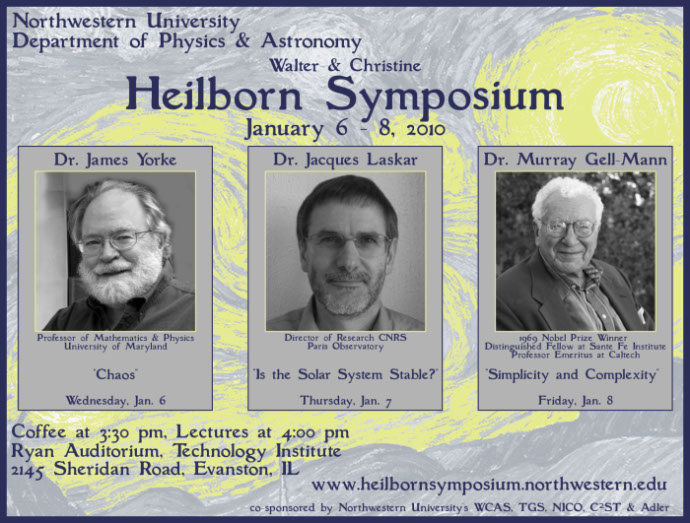The Chicago Council on Science and Technology in partnership with Northwestern University’s Department of Physics and Astronomy presented the Heilborn Lectures.
Ryan Auditorium, Technological Institute, 2145 Sheridan Road, Evanston, IL
Videos are available on Northwestern University’s Department of Physics and Astronomy website.
Wednesday, January 6 at 4:00 PM
Chaos
 Dr. James Yorke
Dr. James Yorke
Few scientists recognized until the last 30 years that scientific environments in which precise rules govern change can be quite unpredictable in the long run. It is not the complexity of our life that causes chaos but rather its instability. Meteorologist Edward Lorenz, one of the founders of chaos theory, suggested in 1960 that the flap of a butterfly wing in Brazil might set off a tornado in Texas, implying that we can never know all the factors that determine our weather. Computer models have greatly helped us understand how pervasive chaos is throughout science. But I continue to wonder, if nearly all scientists missed this pervasive phenomenon, what else might we all be missing now?
Ryan Auditorium, Technological Institute
Thursday, January 7 at 4:00 PM
The Stability of the Solar System
 Dr. Jacques Laskar
Dr. Jacques Laskar
Since its formulation by Newton, the question of the stability of the Solar system has fascinated astronomers and mathematicians for more than three centuries. Although in the past centuries most of the efforts have been devoted to searches for proofs of stability of the Solar system, the recent numerical results show the contrary. New technologies reveal collisional trajectories are possible for all planets of the inner Solar System and help us answer; Is the Solar system stable?
Ryan Auditorium, Technological Institute
Friday, January 8 at 4:00 PM
 Dr. Murray Gell-Mann
Dr. Murray Gell-Mann
Complexity can be examined and defined through ordinary conversations and general scientific discourse. The effective complexity of an entity depends on the level of detail at which the entity is described. Why does complexity seem to keep increasing in a variety of situations? As an example, we can examine the anthropological concept of social complexity. Does it make sense to place pre-industrial societies on a scale of social complexity? Do such societies acquire certain important traits in a more or less regular matter?
